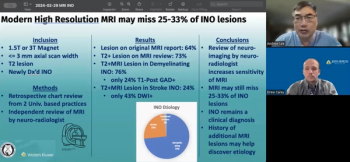
Importance of accreditation in global eye health care
Accreditation programs demonstrate a strong commitment to excellence in patient safety, standardized quality, fiscal responsibility, and collaboration between patients and health care workers.
Special to Ophthalmology Times
Accreditation programs demonstrate a strong commitment to excellence in patient safety, standardized quality, fiscal responsibility, and collaboration between patients and health care workers.
For eye care centers around the world, accreditation opens a pathway of continuous improvement toward higher-quality patient care, efficient facility operations, and better organizational risk, disaster and security preparedness, and continuing medical education.
The Orbis Flying Eye Hospital––the world’s only ophthalmic teaching hospital on board a McDonnell Douglas MD-10 aircraft––sought accreditation from the American Association for Accreditation of Ambulatory Surgery Facilities (AAAASF) for its ambulatory surgery facility, which has been invaluable in Orbis’ programming and planning.
The AAAASF, which accredits thousands of facilities worldwide, was established in 1980 to standardize and improve the quality of health care in outpatient facilities. Its accreditation adds external validation that supports Orbis’ global mission to deliver skills enhancement programs, training, clinical resources, and a collaborative knowledge base built by a network of volunteer faculty, which consists of some of today’s leading ophthalmologists, anesthesiologists, nurses, and biomedical engineers.
For all Orbis clinical and surgical programs, AAAASF accreditation helps the company maintain the proper medical malpractice insurance required to provide care in low- to middle-income countries and strengthen protection against potential malpractice lawsuits. Additionally, it helps support in-country licensing for our surgeons and clinicians and, most importantly, create a system-wide, high-level standardization of our clinically relevant operations.
Orbis employs staff from around the world who come from different backgrounds and medical training. Although all clinical staff are licensed and well qualified, practicing one universal system of procedures is vital to streamline best practices in surgical and clinical patient care and safety standards. This becomes extremely important when we are working with our clinical and surgical counterparts during Orbis programs, as it ensures practice continuity and closes any gaps that could jeopardize patient care.
Closing gaps
Maximizing positive patient outcomes is Orbis’ top priority and instituting the high-quality processes required by accreditation is paramount to that goal. Globally, the risks associated with not implementing proper clinical and surgical safety standards are equivalent regardless of geographical location: Patient safety has no borders.
Conducting clinical and surgical interventions, screening, monitoring, infection control, and documentation in a manner consistent with optimal safety, results in a high-level, evidence-based global standard.
Today, there is significant variability among eye health care practices across nonaccredited facilities. Using a third party to benchmark, review, and supply accreditation is ultimately the best way forward. For Orbis, AAAASF’s international standards, emphasis on policy implementation, commitment to education, and responsive communication aligned with our organizational skills and systems transfer program model to reduce variability in care.
AAAASF accreditation of the Orbis Flying Eye Hospital adds exponential value at multiple touchpoints. Orbis was built on innovation and has expanded in scope throughout its more than 30-year existence. Today, the company operates a variety of multichannel educational programs aimed at increasing the proficiency levels of eye health professionals and facilities.
What makes the Flying Eye Hospital unique is its use as a mobile platform to demonstrate accreditation practices to different ophthalmic communities around the world. With its state-of-the-art onboard operating theater, Orbis is committed to ensuring that each patient receives the highest level of clinical and surgical care no matter where they live. This commitment, which goes above and beyond, is a powerful testament to the importance of accreditation, enabling Orbis to achieve its goal of implementing globally recognized, consistent clinical and surgical benchmarks designed for health care workers to adopt best practices for every ophthalmic discipline.
The decision to seek accreditation was a statement by Orbis that the “good enough” model of charitable health care is not, in our opinion, good enough.
Areas of focus
Across all Orbis programs, there are several important areas we introduce to our partners that are aligned with AAAASF’s global safety accreditation protocols.
The first is the mindset that accreditation creates when teams of eye care professionals follow uniform processes. Understanding each patient, staff member, and equipment touchpoint and how they connect to the overall goal of patient safety through standardized repetition instills commitment and quality, creating a culture of safety.
This is particularly important when working as a team, which is common in a clinical and surgical setting. When staff members adhere to the same high-quality set of standards for each task, it creates consistency, which then breeds quality and accountability that reduces the level of risk to patient safety. Team training is crucial to the success of supporting the proper mindset.
Modeling proper processes when working directly with our in-country host partners is critical for Orbis training programs, and accreditation instills consistency and high quality in those processes as we aim to implement them. Standardization helps overcome assumptions and potential miscommunications among our staff and between our volunteer faculty and host-country partners.
Documentation and benchmarking are very important for a variety of reasons. Surgical logs, instrument sterilization logs, consumable tracking, and so on leave a trail of data that can be easily referenced in the event questions arise about a particular case, or in the unfortunate event of an infection or other unanticipated sequela. For example, robust documentation shows which instruments were used during a surgical case, how they were used, and the movement of those particular instruments before surgery.
Documentation of medical consumables is of vital importance as well. Tracking the supply chain and documenting information about when consumables were received, when they expire, how they are stored, appropriate temperatures maintained, and when they are used helps maintain clinical and surgical excellence and reduces patient risk. This level of forensic process can also help identify other patients who may have been exposed to a potential risk factor. Having a third-party assessor such as AAAASF review and accredit our clinical and surgical programs gives us the confidence that Orbis teams can replicate critical tasks when we work with our host-country partners.
The benchmarks set forth by AAAASF extend the global, high-level standardization of quality patient care that we aim to achieve during each Orbis program. In its ongoing effort to assess and improve patient care, AAAASF developed a quality assurance program that involves both traditional peer review and online patient-safety data reporting to analyze surgical outcomes for all the facilities it accredits. This includes the Flying Eye Hospital, which regularly submits mandatory reporting of clinical and surgical processes, including case reviews of surgeries conducted onboard the aircraft.
The AAAASF data set includes millions of patient procedures dating back to 2001, and is used for patient safety research, journal articles, and standards revisions.
Simple steps
A significant contribution of AAAASF is the organization’s ability to provide an objective review of proper health care standards and highlight operational gaps that are relevant to each of our partner eye care centers. Orbis regularly invites surveyors from AAAASF to join our programs and work directly with our staff and partners on the major areas of concern for that particular partner hospital or ministry of health–level facility.
The review includes walking through the hospital or facility with key personnel to examine their systems and infrastructure in a nonconfrontational, nonjudgmental, and educational manner. This yields a greater level of trust and understanding, which is needed to adopt and implement higher clinical and surgical standards. In many cases, the adjustments required to address gaps cost little or nothing to implement.
An additional benefit is the resources an accreditor such as AAAASF can leave behind for the hospital staff to review and then integrate into existing training programs and clinical policies or, in some cases, create their own ones to be implemented. Sometimes it is the simplest of ideas that can greatly improve overall safety in a hospital setting, particularly in low- to mid-income countries.
The next phase of maintaining the educational component of accreditation can be found in e-learning. Cybersight (
One major component of accreditation concerns the ongoing training of staff. Although many facilities are very conscientious about clinical training, accreditation also focuses on training that is relative to specific job functions, equipment use, and emergency preparedness roles.
This ensures the facility staff are prepared not only to treat, but also to respond to an emergency and to perform their other operational functions, such as instrument processing. Creating on-demand materials that can be accessed by the staff of a partner hospital is an impactful offering and key component within a clinical or surgical training curriculum. This is the next step in instituting global accreditation processes within a health care setting. Lectures, forms, and standardized checklists are all part of the distance- learning curriculum that Orbis aims to introduce with AAAASF in the future.
No longer the baseline
Accreditation validates the agreed-upon systems of patient safety and facility integrity through clinical and surgical documentation that records checks and balances to demonstrate that high-level processes are being practiced, thereby maximizing patient outcomes and safety.
Is it important that the same processes and procedures are in place all over the world to protect patients? Would a universal system of high-level standards benefit eye health care if all facilities used the same processes? Absolutely.
The result would be streamlined, high-level protocols and patient-focused practices, which would create a cause-and-effect scenario of not only patient care but community safety. We must encourage a continuous pursuit of clinical and surgical safety to ensure the highest possible standard of care. Most importantly, safety has to be reproducible and facility data should be collected, analyzed, and studied to ensure quality.
Degrees of accreditation
Setting goals and undertaking long-term planning in cooperation with our country partners are key elements in helping to raise the bar in clinical and surgical care. The ultimate goal is for our partners to adopt and put into practice the outlined global standards of accreditation.
Employing a step-by-step process can be the most successful method to achieve this, especially when faced with barriers. Such barriers include lack of government or institutional mandates regarding a country’s health care system, costs associated with implementing new processes, challenging national infrastructure, and the idea that instituting these practices will not offer an immediate return on investment when facilities are considering budget-cutting measures. In some parts of the world, difficult fiduciary decisions must be made to meet the demand of current health situations.
Furthermore, accreditation requires institutions to review their processes with a critical eye. Annual chart reviews, surveys, and documented training programs may strain the demand for human resources. Unfortunately, this is a level of commitment that many eye health centers are simply unable or unwilling to attain.
However, interim advancements can still be made and all Orbis partners institute long-term action plans that integrate a high-level standard of practice mandated by accreditation. This is why it is just as important, even if the institution is not yet applying for or seeking formal accreditation, to begin implementing accreditation-defined processes immediately. We understand that many of our partners do not have the resources to achieve (or potentially afford) a formal accreditation, which makes Orbis’ programs so impactful. We do not overwhelm our partners with an entire accreditation structure, or process, all at once. Instead, we introduce the most critical and practical components that can be reasonably adopted. In time, we can build upon previously met goals, creating a lifelong pathway of continuing medical education, quality assurance, and safety that supports evolving systems of clinical excellence.
Newsletter
Don’t miss out—get Ophthalmology Times updates on the latest clinical advancements and expert interviews, straight to your inbox.





























